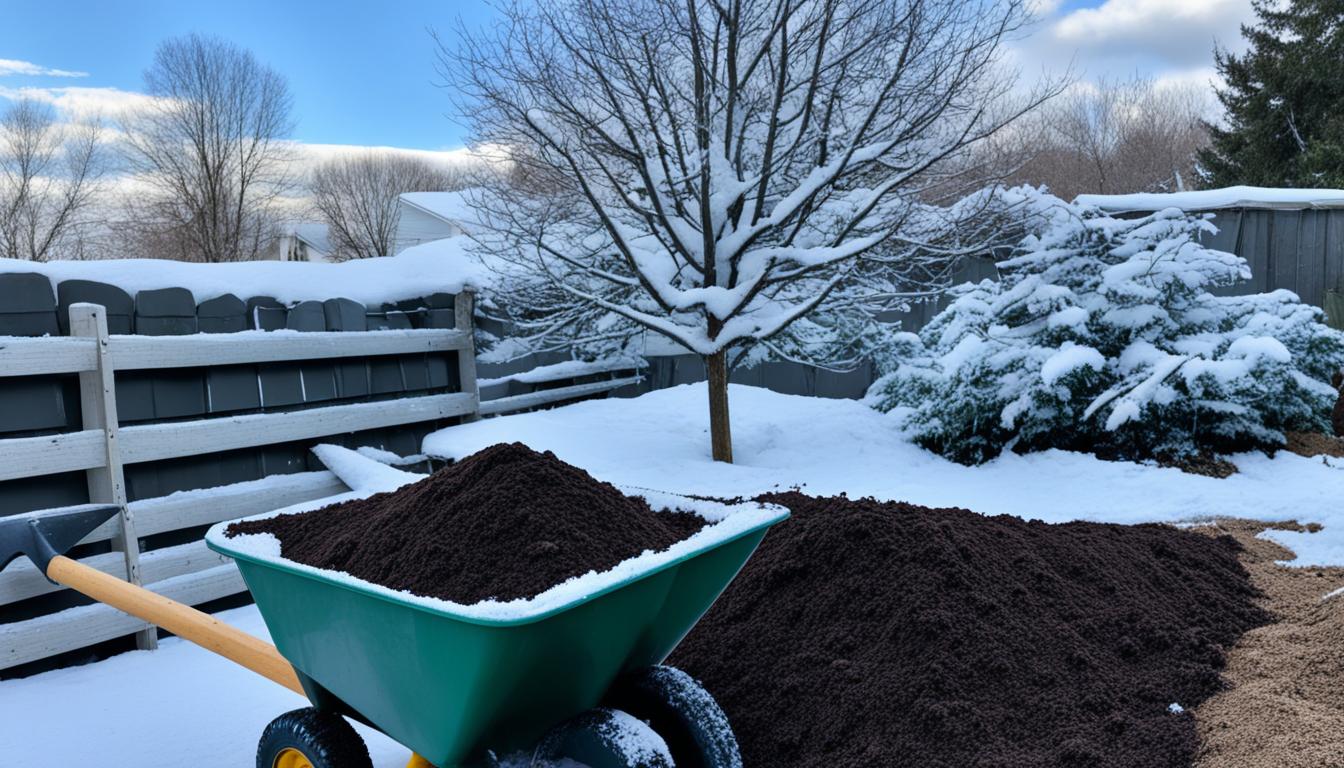As a passionate gardener, I know how crucial it is to get my soil ready for spring. Winter is a great time to boost my garden’s health and fertility. With a few easy steps, I can make sure my garden thrives come spring.
One top way to enrich my soil over winter is by planting cover crops, or “green manures.” These tough plants prevent soil erosion and add vital nutrients like nitrogen as they break down. I plant cover crops 15 to 45 days before the first frost, spreading seeds widely for a thick cover.
I pick cover crops based on my climate and what I like. Options include nitrogen-fixing legumes like red clover or peas, and non-legume crops like rye or mustard. These help control erosion and manage nitrogen levels. It’s important to choose varieties that are tough for winter or will break down in spring.
Grow Cover Crops
As the gardening season ends, it’s time to think about cover crops. These plants are the garden’s hidden gems, working hard to enrich the soil over winter. There are two types: winter-hardy and winter-kill. Each type has its own benefits for your garden beds.
Winter-Hardy and Winter-Kill Cover Crops
Winter-hardy cover crops, like rye and oats, keep growing in the cold. They add organic matter and nutrients to the soil. On the other hand, winter-kill crops, such as frosty buckwheat, die off in the cold. They leave behind a mulch layer that breaks down, enriching the soil.
- Winter-hardy cover crops like rye and oats continue growing through the winter, adding organic matter and nutrients to the soil.
- Winter-kill cover crops like buckwheat and field peas die off in the cold, creating a protective mulch layer that breaks down over time.
- Legumes like clover and vetch are excellent nitrogen-fixing plants for winter, replenishing the soil with this essential nutrient.
- Cover crops can reduce nitrogen loss from the soil by up to 97%, making them a valuable addition to any cover crops for garden beds.
Choosing cover crops can change the game for your garden. They protect the soil, control weeds, and give your plants a boost in the spring. So, why not start next year’s growth by planting cover crops this fall?
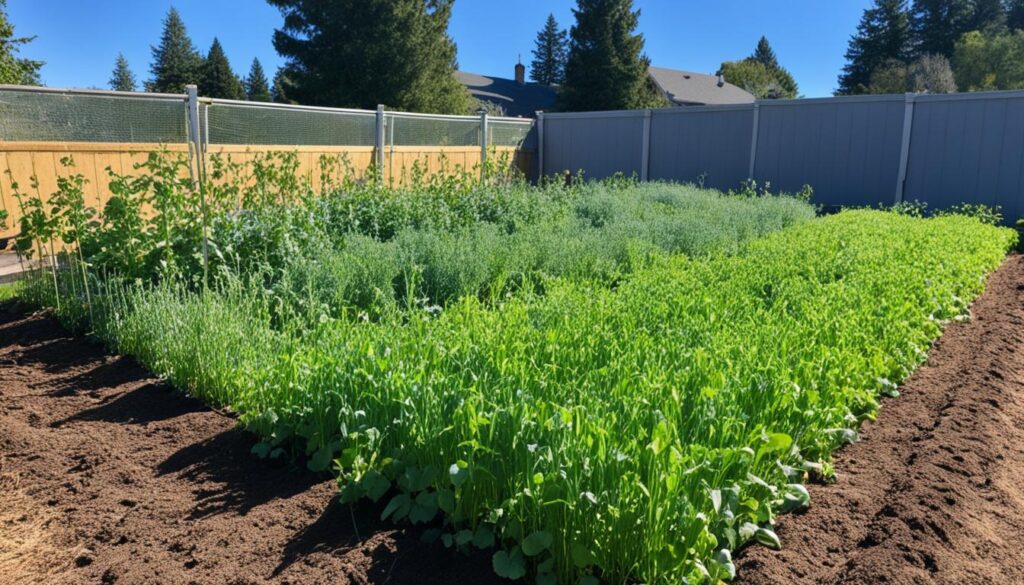
Cover With Mulch
If you don’t want to plant cover crops, think about using mulch instead. This easy method shields your garden soil from harsh winter weather and keeps everything in place. Organic mulches like bark, wood chips, straw, grass clippings, rice hulls, and fallen leaves cover the ground. They also add nutrients to the soil as they break down.
Inorganic mulches such as decomposed granite, pea gravel, and rip rap work well too. For your garden, spread a 2-3 inch layer of your chosen mulch over the entire bed. This layer insulates roots, keeps soil moist, and stops weeds from growing during the cold season.
- Organic mulches like wood chips, leaves, and straw improve soil fertility as they decompose.
- Inorganic mulches like gravel or rocks offer a protective cover without adding nutrients.
- Apply mulch in a 2-3 inch layer to insulate plant roots and retain soil moisture.
- Check soil moisture and water if needed to keep plants healthy through winter.
Mulching is a simple, budget-friendly way to help your garden through winter. It protects the soil and adds organic matter. This prepares your garden for a healthy growing season next year.
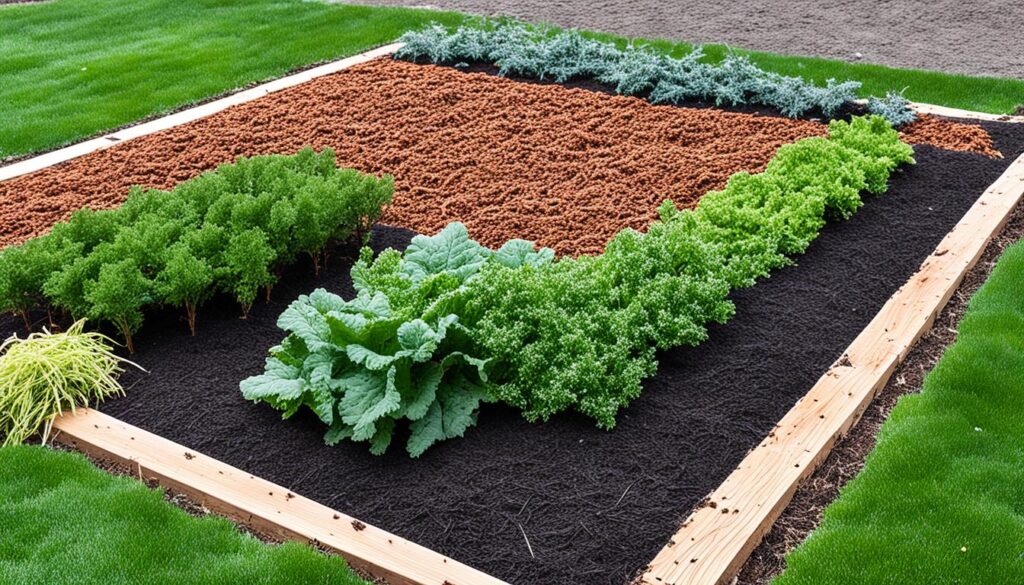
Compost
Composting is a great way to make your garden soil better over the winter. It gives important food to the tiny organisms that keep the soil healthy. Even though it gets colder, you can make it work faster with a few tips.
Try cutting your “browns” (like dried leaves or shredded paper) and “greens” (like fruit and vegetable scraps) into smaller bits. This makes it easier for the microbes to break them down. Starting a compost pile in winter helps you get into the habit without feeling too stressed.
| Compost Ingredients | Benefits |
|---|---|
| Shredded leaves | Adds carbon and improves soil texture |
| Fruit and vegetable scraps | Provides nitrogen for microorganisms |
| Coffee grounds and tea leaves | Enriches soil with nutrients |
| Eggshells | Adds calcium to the soil |
| Grass clippings (chemical-free) | Boosts nitrogen levels |
Adding compost to your garden soil feeds the tiny organisms that are key for plant health and growth. Composting over winter is an easy yet powerful way to help your garden grow better.
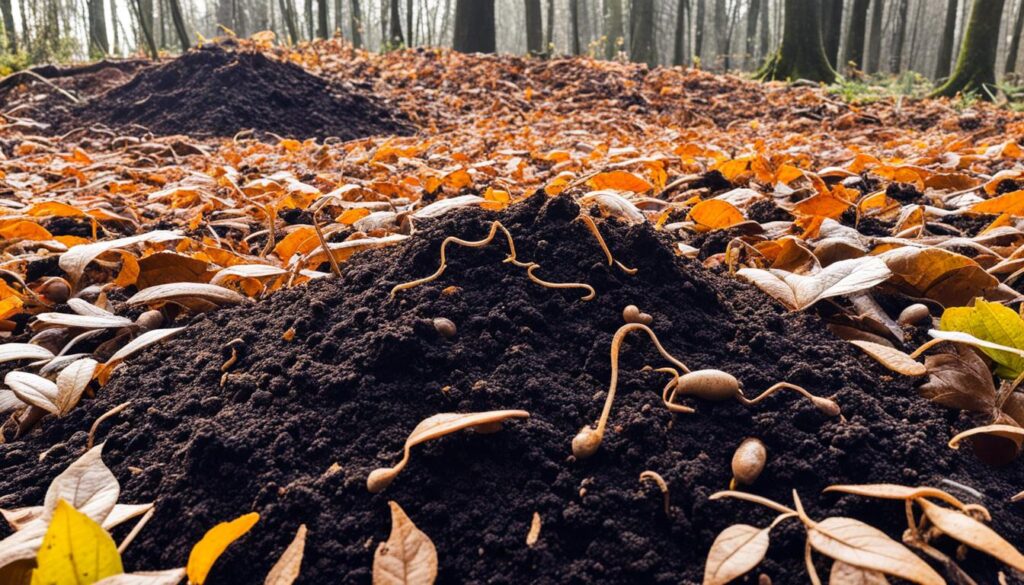
how to improve garden soil over the winter
When the weather gets colder and your garden sleeps, it’s a great time to get your soil ready for spring. By doing a few simple things during the winter, you can make your soil rich in nutrients and well-draining. This will help your plants grow strong when the weather warms up again.
First, you should test your soil. This will show you the pH level and what nutrients it has. If your soil is too acidic or alkaline, you can fix it with lime or sulfur. For nutrient shortages, add compost or aged manure.
- Consider doing a soil test to determine the need for pH-raising materials like lime or acidifying items like elemental sulfur.
- Place a 3- to 4-inch layer of compost on your garden.
- Apply a 1-inch-thick layer of aged cow or horse manure.
- Lightly apply organic fertilizers like greensand, rock phosphate, kelp meal, bonemeal, or bloodmeal.
- Cover compost and fertilizers with a layer of fall leaves, chopped up with a mower.
- Consider planting cover crops such as clover, red wheat, cereal grain, or annual rye.
Spending time on your soil in the winter will help your plants grow better in the spring. Don’t use a rototiller on beds that are already established, as it can bring up weed seeds. Instead, add more organic matter and cover the soil with mulch or cover crops. These actions will lead to a garden that’s full of life and healthy in the future.
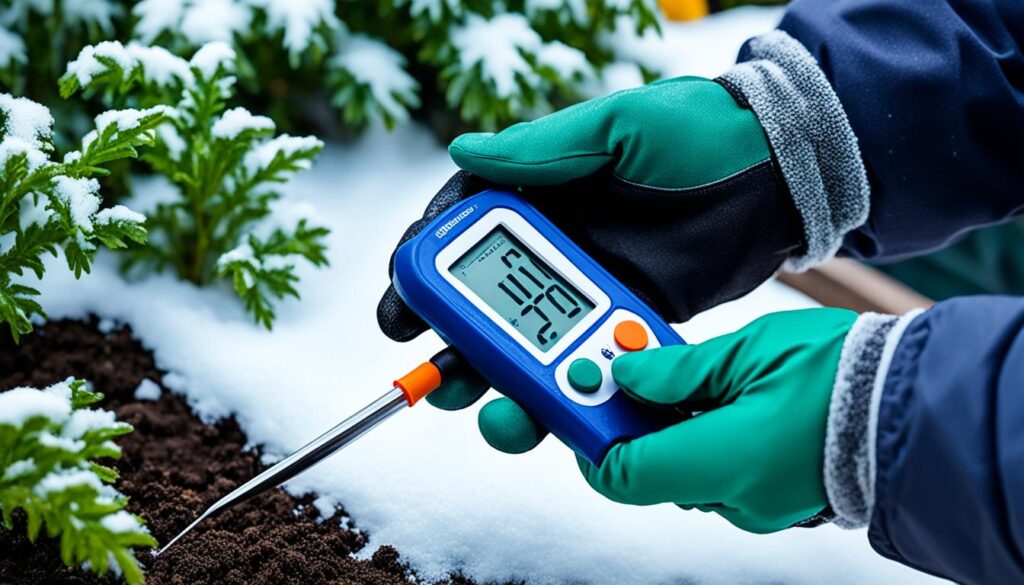
Protect Soil with Mulch or Compost
As the gardening season ends, it’s key to protect and feed your soil over winter. Applying mulch or compost to your garden beds is a great way to do this.
Putting a thick layer of mulch like shredded leaves, straw, or wood chips on your garden beds helps with soil temperature and moisture. It also stops soil from getting compacted by snow and rain. Plus, as mulch breaks down, it adds organic matter to the soil. This feeds the microorganisms that keep the soil healthy and fertile.
Adding compost to your garden beds is another smart move for winter. Putting a few inches of compost on your beds before they freeze gives nutrients to soil microorganisms. This boosts your soil’s structure and fertility, making it ready for a great growing season next year.
| Winter Soil Amendments | Benefits |
|---|---|
| Mulch (shredded leaves, straw, wood chips) |
|
| Compost |
|
By using winter soil amendments like mulch or compost, you’re helping your garden in the long run. This simple step of mulching garden soil or composting over winter can greatly improve your soil quality. It sets your garden up for success next year.
Tolerate Winter Weeds
As winter comes, we learn that not all weeds are bad for our gardens. Some winter weeds can actually help improve the how to improve garden soil over the winter. Weeds like dandelions, bittercress, henbit, and chickweed protect the soil from erosion. They also provide food and shelter for wildlife during the cold months.
These winter weeds have thin taproots that make the soil drain better. They don’t spread out like summer weeds do. It’s good to let them grow in the winter. Then, in early spring, you can chop them down and add them to your compost. This way, they turn into nutrient-rich soil.
- Dandelions, bittercress, henbit, and chickweed can help protect soil from erosion
- Thin taproots of these weeds improve soil drainage
- Hoe down the weeds in early spring and add them to the compost pile
By letting these winter weeds grow, you’re taking a green step towards how to improve garden soil over the winter. This approach prepares your garden for a healthy start in the next seasons.
Conclusion
Getting my garden soil ready for winter is key to a great growing season. I use simple steps like cover cropping, mulching, and composting. These methods make sure my soil is full of nutrients and has good microorganisms.
By the end of the gardening year, I test my soil and fix any issues. I also cover or protect it from harsh weather. This hard work in winter means I can start planting early in spring and have a big harvest.
Preparing my garden soil for winter is a must-do every year. These simple, budget-friendly steps create the perfect environment for my plants. I love taking care of my soil and seeing my garden grow well because of it.
FAQ
What are the benefits of preparing garden soil over the winter?
Preparing garden soil in winter has many advantages. It improves soil quality and protects it from erosion. It also prepares the soil for a healthy garden in spring.
By growing cover crops, applying mulch, and adding compost, gardeners boost soil nutrients and microbial activity. This supports healthy plant growth.
What types of cover crops are best for winter gardens?
There are two main types of cover crops for winter gardens. Winter-hardy crops like rye and hairy vetch keep growing in the cold. They add green manure in spring.
Winter-kill crops like oats and buckwheat die off with the frost. Yet, they protect the soil and decompose, enriching it.
How does mulch benefit garden soil over winter?
Using organic mulch like wood chips, leaves, or straw protects garden soil from winter harshness. Mulch keeps soil moist, regulates temperature, and prevents compaction from snow and rain.
As mulch breaks down, it adds valuable nutrients back into the soil.
Why is composting important for winter soil preparation?
Composting in winter feeds the essential microorganisms that keep garden soil healthy. Even though decomposition slows in the cold, chopping compost ingredients helps speed it up. Starting a compost pile in winter is a great way to prepare for soil building.
When is the best time to test garden soil in winter?
Testing garden soil in winter is a good idea, even when it’s off-season. It helps check nutrient levels and pH. This info guides what amendments to add for spring planting.
Many soil testing services suggest testing in late fall or early winter for the best results.
How can mulch and compost protect garden soil in winter?
Using compost or mulch over garden beds in winter helps with soil temperature and moisture regulation. It cushions the bed and prevents compaction from snow and rain.
Organic matter like compost and mulch feeds the soil’s crucial microorganisms.
Are all winter weeds bad for the garden?
Not all winter weeds are bad for gardens. Some, like dandelions, chickweed, and henbit, protect soil from erosion and feed wildlife. They also improve drainage with their thin taproots.
These weeds can be hoed down and added to compost in early spring.
